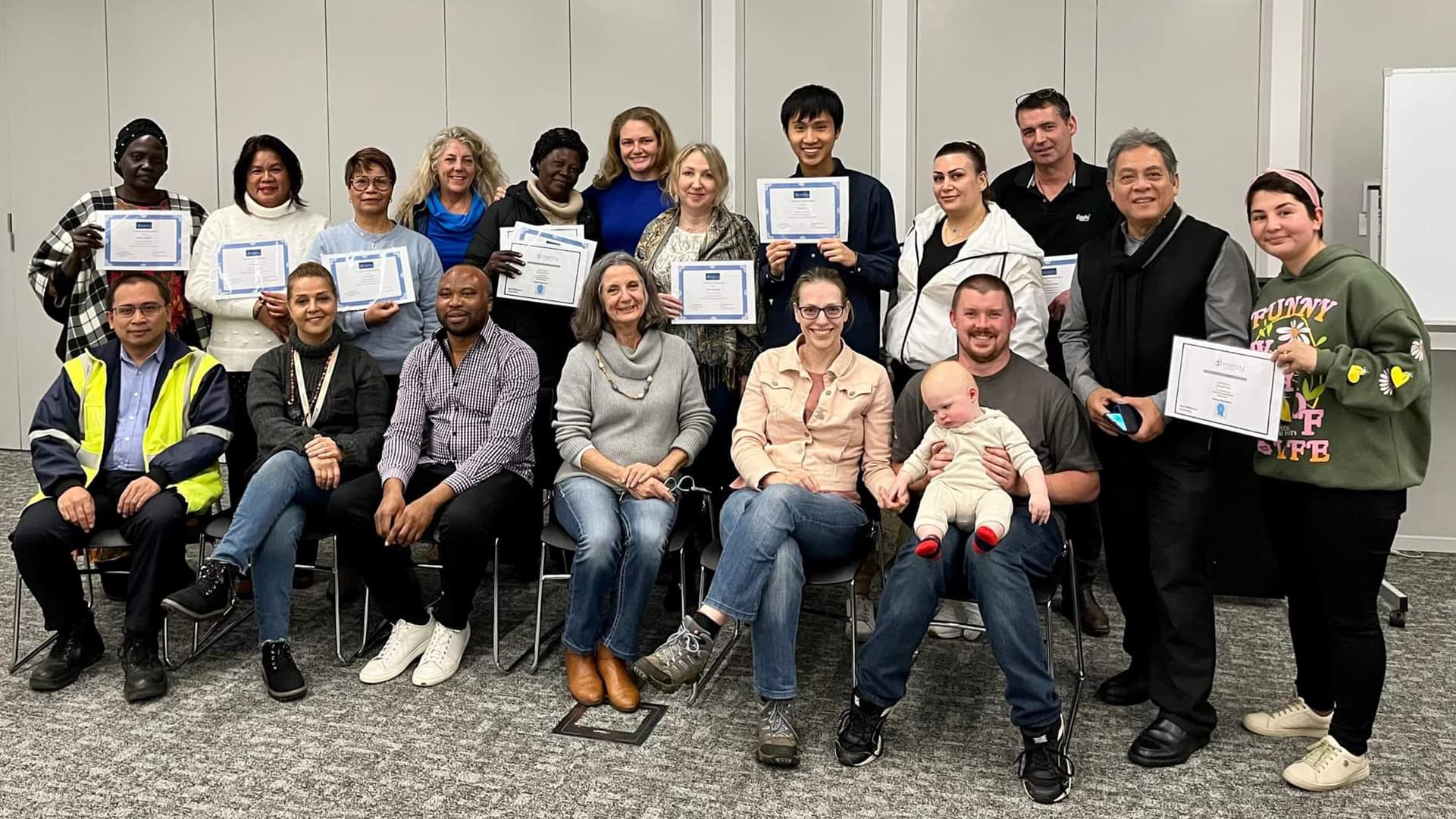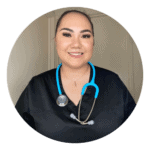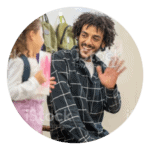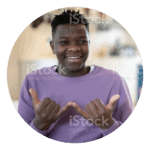
In just over a week, members of our Families and Young People Services CAMS team in Toowoomba will be making their way to Suncorp Stadium in Brisbane for the 2022 Get Ready Queensland Resilient Australia Awards.
These awards celebrate Queenslanders going above and beyond in their initiatives to build whole of community resilience to disasters and emergencies around Australia.
We are proud to share that Jane Williamson and her team have been nominated for the leading work they’ve been doing with culturally diverse peoples in Toowoomba—and more than that, we’re proud of the work itself and the positive impact Jane and her team are having on the local community.
Jane is Mercy Community’s Coordinator for the Greater Downs Local Level Alliance (GDLLA) and Community Action for a Multicultural Society (CAMS) in Toowoomba, and her team includes Multicultural Community Workers Nestor Kangudia and Mojgan Namdari. Together, their work supports the initiatives of Mercy Community’s Cultural Diversity Hub in Toowoomba. Through the Hub, Mercy Community delivers a range of multicultural programs for refugees and migrant families in the Toowoomba and Southwest Regions, Queensland’s highest area of regional refugee settlement.
The work of Jane, Nestor and Mojgan has become the leading approach to working with vulnerable communities.
But first—what are LLA and CAMS?
Local Level Alliance (LLA) and Community Action for a Multicultural Society (CAMS)
Jane explains:
‘LLA and CAMS are two different programs that I’ve merged together.
LLA is about bringing together all the organisations, government bodies, etc, who work with vulnerable families and young people, so that they can all work more collaboratively and share information as to what each service does. The goal of this is to provide early intervention supports to families, with the ultimate objective of keeping families together and out of the tertiary system, which is Child Safety.
Within the LLA, we work with a wide variety of families and communities, we work with First Nations organisations, and we work with Culturally and Linguistically Diverse (CALD) organisations.
The CAMS program is a little more activity focussed. In that program, we have been doing disaster management in CALD communities. We also run a program called Safe Families, which is all about Domestic Violence (DV) in CALD communities, and involves collaborating with other organisations who belong to the GDLLA,’ said Jane. ‘In addition, we are currently supporting the Seasonal Workers from the South Pacific Islands.’
The work that Jane has done in bringing the two programs together has created a powerful network of over 1,000 people. This includes people such as caseworkers, managers and regional directors, from all sorts of different organisations such as drug and alcohol support services, mental health support services, local hospitals, education, employment, young people support services and early education.
‘We approach our work from a community development perspective. What we do in GDLLA and the CAMS program is look at emerging issues, what the needs are, and collaborate with the different organisations to provide services more efficiently and effectively to address those needs—whether they be emerging issues or systemic,’ said Jane.
Disaster Management and collaborating with communities
When the Department of Children, Youth Justice and Multicultural Affairs announced grants for Disaster Management initiatives, Jane and the team applied, with CALD communities in mind.
The application was successful, and so the team partnered with Red Cross and Toowoomba Regional Council’s Disaster Management team to put together a program.
‘My initiative with this program was to recognise that we can all learn from each other.’
Jane Williamson
‘We engaged with existing leaders of the various CALD communities and invited them to become participants in these programs. There are 32 different language groups in Toowoomba and those leaders are already recognised within their communities.’
‘The community leaders then become ambassadors,’ said Jane. ‘As ambassadors, they can go back to their communities and share information in a more culturally appropriate manner. Many of these people have come from war zones so they have a good understanding of evacuation. However, they may not have an understanding about preparation and of course the recovery supports in Queensland.’
Likewise, Jane explains, we may not have an understanding about the needs of different cultures in evacuation centres. For example, in some communities the men need to be separated from the women and in other communities, they need to be together. Many only eat halal blessed foods.
‘So rather than us saying “We’re going to do this program in the Sudanese community,” we bring everyone together from a multitude of communities, which is quite fantastic,’ said Jane.
‘We have 16 different language-speaking people in the Disaster Management group, which ran for 15 months. We developed a wonderful camaraderie and enjoyed wonderful collaborations—and we’ve since been nominated as finalists in the 2022 Get Ready Queensland Resilient Australia Awards.’
A positive ripple effect
From the success of the Disaster Management Group, Jane was invited to join the Local Disaster Management Group (LDMG).
‘That includes the head of Queensland Fire Service, State Emergency Service, Qld Ambulance Services, Toowoomba Regional Council etc. [I was invited] to bring the voice of the CALD group. Now I would like to change my membership to being somebody FROM that CALD group—to bring the knowledge that we’re learning from the people to the ‘official’ Local Disaster Management Group is wonderful,’ said Jane.
There are several ways this connection benefits the community. Jane explains that for people who’ve come from war zones, finding out first-hand that people in uniform can be trusted is incredibly important, especially before an emergency, because that’s when panic can set in.
A leading approach across other programs
‘We use that same model now with Safe Families. You can imagine that Domestic Violence in CALD communities is a very sensitive topic, because a lot of people come from countries where male dominance is culturally entrenched,’ said Jane.
‘So again, we work with some of the local service providers and Queensland Police Service to exchange knowledge again and communicate how things work in Australia. We’re able to say “Well yes, it used to be like that for us too” you know, in my lifetime even, but now with the United Nations, and equity and equality, things are changing. But more importantly, it’s also now law in Australia, so people need to be aware of Domestic Violence law here, and the consequences.’
[By working collaboratively with all communities] we can look at the spectrum of what can happen in Domestic Violence situations as well as what DV means, which now includes coercion and financial abuse and all those complexities. It’s a learning curve for us too because a lot of these things are coming in quick and fast.’
Setting a new standard
In the same way that Jane and the team worked with the Disaster Management group, this method can work across different program areas.
‘It’s a model,’ said Jane. ‘It’s quite different. Normally, in the past, you come up with a project and you target one community and try and bring in people from that one community. But we don’t do that. We try and bring in people from all different communities.’
Jane’s background is in Community Development, particularly with Aboriginal and multicultural groups, and she has worked and lived with Aboriginal people for many years.
Bringing in people from all different communities is also how Jane approaches her work with the GDLLA.
‘We have meetings every month, with 40 to 50 people rotating in that meeting. At the beginning of those meetings an Aboriginal person within the group will give an Acknowledgment to Country, but also talk about their life, their family, and their experiences as an Aboriginal person. After that, we have a Cultural Connections story which is someone from a different country sharing about what happened in their country, how they’ve come to Australia, what their experiences have been as they’ve settled in, etc, so all those organisations who are part of the LLA can become more culturally competent—and that in turn makes those organisations safer for multicultural families or First Nations families,’ said Jane.
Success in Toowoomba
While both Nestor and Mogjan work with Jane, they each run their own successful programs within the community.
‘Craft for Change’ is a CAMS sewing program that Mojgan coordinates. This program has many objectives, but the main focus is to support the ladies to build skills that will enable them to gain employment and make some sort of financial return, such as a social enterprise like an alterations or sewing organisation.
‘In that program,’ explains Mojgan, ‘we have a Congolese lady who is the teacher, and she is an amazing garment maker. We invited ladies from different communities to come—from Pakistan, from Afghanistan, Vietnam, Malaysia, Africa and from China. I tried to invite the ladies who are isolated or who have experienced Domestic Violence. Most of them are the ladies who don’t like to have conversations, don’t trust easily, don’t come out from their houses. We try to build that trust. In the beginning, they didn’t even like to sit next to a person from another community, but I have seen a real improvement.
Now they trust each other, they sit together, they have conversations, they cook, bring food, eat together and ask each other ‘How did you cook this?’. They do more than improve their sewing skills—they improve their English too. I can see them trying to speak with each other,’ said Mojgan.
‘They are laughing and talking more. It is a success; I can see it in their faces.’
Mojgan Namdari
The Department of Children, Youth Justice and Multicultural Affairs filmed the ‘Craft for Change’ group to tell this inspiring multicultural story. You can view the video here.
Nestor’s Social Soccer program is also having a big impact. He works with refugees, the majority of whom are from the Ezidi community. These people are the last group of refugees to come to Australia before the pandemic, and there are about 3-4000 people from this community in the area. According to the last census, after English, the Kurdish dialect Kurmanji is the most spoken language in Toowoomba.
‘The project is called ‘Everyone’s Game’ said Nestor, ‘and it is an initiative under the Toowoomba Regional Council. Through sport, we want young people to get active and fit. We came together and created a sport called Social Soccer, and we have involved young people from high schools and primary schools as well. We started with one team, but we have three teams with adults now. It’s really doing well.’
The objective of Social Soccer is to develop social inclusion, with an emphasis on pathways to employment. The program builds the capacity of young people who are often quite traumatised, which shows up in social ways such as with punctuality, discipline and respect.
Nestor explains that the game itself helps the young people with more than fitness. ‘Because soccer has a lot of rules, we can help them with discipline too,’ said Nestor. ‘Through those rules, the young people are learning how to respect others and how to respect the coach. It’s a really good program.’
Jane adds: ‘I must say too that Nestor has been very instrumental in bringing together the leaders of the 12 different African nations who live in Toowoomba now, to come together as one united group, even though they come from very different cultures.’
The 2022 Get Ready Queensland Resilient Australia Awards are about the model and its outcomes.
‘We’ve been busy,’ said Jane.
‘In Australia we have First Nations programs that run on one track, a mainstream track and then CALD communities: This is important however in my role I try to mix it all up to provide one united approach. We’re all working from the same page but understanding and respecting each other’s cultural background so that we all learn from each other. It builds the capacity of all of us—all those different social groups—and makes us a much more united safer place.’
Queensland winners of the 2022 Get Ready Queensland Resilient Australia Awards will be announced at a ceremony on September 8, before the national awards in late 2022.



